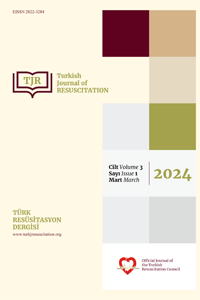Abstract
Head traumas are acute clinical conditions with a high mortality risk and a low probability of complete recovery. In addition to the primary injuries that start at the time of the incident, early diagnosis and therapy of the damages that increase the severity of head trauma, preventable secondary damages such as hypoxia, hypotension, normocapnia, and all kinds of treatments and manoeuvres that prevent the increase of intracranial pressure contribute to the quality of survival.
The role of experienced teams and advanced trauma centres is very vital in this regard. National trauma guidelines should be established and used routinely.
Keywords
References
- Ulusal Sağlık ve Klinik Mükemmellik Enstitüsü (Birleşik Krallık. Kafa Travması: değerlendirme ve erken müdahale. Güncelleme kılavuzu Haziran 2017, www.braintrauma.org
- Carney N., Totten A.M, O’Reilly C. et all. Guidelines for the management of severe traumatic brain injury, fourth edition. Brain Trauma Foundation Guidelines. Neurosurgery 2017; 80:6-15.
- Hawryluk G.W.J., Aguilera S., Buki A., et all. A management algorithm for patients with intracranial pressure monitoring:the Seattle International Severe Traumatic Brain Injury Consensus Conference (SIBICC) Intensive Care Med 2019; 45:1783-94.
- Lott C, Truhlář A, Alfonzo A, et al. European Resuscitation Council Guidelines 2021: Cardiac arrest in special circumstances. Resuscitation 2021;161:152-219.
- Rossaint, R., Afshari, A., Bouillon, B, et al. The European guideline on management of major bleeding and coagulopathy following trauma: sixth edition. Crit Care 2023;27(1):80.
- Perkins G.D, Callaway C.W., Haywood K., et all. Cardiac arrest 2 Brain injury after cardiac arrest. Lancet 2021;398:1269-78.
- Gentleman D., Dearden M., Midgley S., et all. Guidelines for resuscitation and transfer of patients with serious head injury. BMJ 1993;307:547-52.
- Spahn D.R., Bouillon B., Cerny V., et all. The European guideline on managementof majör bleeding and coagulopathy following trauma: fifth edition. Critical Care 2019; 23:98.
- Cole E, Weaver A, Gall L, et al. A Decade of Damage Control Resuscitation: New Transfusion Practice, New Survivors, New Directions. Ann Surg. 2021;273(6):1215-20.
- Rossaint, R., Afshari, A., Bouillon, B, et al. The European guideline on management of major bleeding and coagulopathy following trauma: sixth edition. Crit Care 2023;27(1):80.
- Roberts I, Shakur-Still H, Aeron-Thomas A. Et all. Tranexamic acid to reduce head injury death in people with traumatic brain injury: the CRASH-3 interantional RCT. Health Technology Assessment Vol 25, Issue 26, April 2021, ISSN 1366-5278.
- CRASH-3 trial collaborators. Effects of tranexamic acid on death, disability, vascular occlusive events and other morbidities in patients with acute traumatic brain injury (CRASH-3): a randomised, placebo-controlled trial. Lancet2019;394(10210):1713-23.
- Tran A, Yates J, Lau A, Lampron J, Matar M. Permissive hypotension versus conventional resuscitation strategies in adult trauma patients with hemorrhagic shock: A systematic review and meta-analysis of randomized controlled trials. J Trauma Acute Care Surg 2018;84(5):802-8.
- Hawryluk G.W.J., Rubiano A.M., Totten A.M., et all Guidelines for the management of severe traumatic brain injury:2020 update of the decompressive craniectomy recommendations. Neurosurgery 2020;87:427-34.
Abstract
Kafa travmaları mortalite riski yüksek ve tam iyileşme olasılığı az olan akut klinik durumlardır. Olay anında başlayan birincil hasarlara ek olarak kafa travmasının şiddetini artıran ve önlenebilir sekonder hasarlar olan hipoksi, hipotansiyon, normokapni ve intrakraniyal basınç artışını engelleyen her türlü tedavi ve manevraların erken tanı ve tedavisi ile kaliteli sağ kalıma katkı sağlanır. Bu konuda deneyimli ekiplerin ve gelişmiş travma merkezlerinin rolü çok önemlidir. Ulusal travma kılavuzları mutlaka oluşturulmalı ve rutin olarak kullanılmalıdır.
Keywords
References
- Ulusal Sağlık ve Klinik Mükemmellik Enstitüsü (Birleşik Krallık. Kafa Travması: değerlendirme ve erken müdahale. Güncelleme kılavuzu Haziran 2017, www.braintrauma.org
- Carney N., Totten A.M, O’Reilly C. et all. Guidelines for the management of severe traumatic brain injury, fourth edition. Brain Trauma Foundation Guidelines. Neurosurgery 2017; 80:6-15.
- Hawryluk G.W.J., Aguilera S., Buki A., et all. A management algorithm for patients with intracranial pressure monitoring:the Seattle International Severe Traumatic Brain Injury Consensus Conference (SIBICC) Intensive Care Med 2019; 45:1783-94.
- Lott C, Truhlář A, Alfonzo A, et al. European Resuscitation Council Guidelines 2021: Cardiac arrest in special circumstances. Resuscitation 2021;161:152-219.
- Rossaint, R., Afshari, A., Bouillon, B, et al. The European guideline on management of major bleeding and coagulopathy following trauma: sixth edition. Crit Care 2023;27(1):80.
- Perkins G.D, Callaway C.W., Haywood K., et all. Cardiac arrest 2 Brain injury after cardiac arrest. Lancet 2021;398:1269-78.
- Gentleman D., Dearden M., Midgley S., et all. Guidelines for resuscitation and transfer of patients with serious head injury. BMJ 1993;307:547-52.
- Spahn D.R., Bouillon B., Cerny V., et all. The European guideline on managementof majör bleeding and coagulopathy following trauma: fifth edition. Critical Care 2019; 23:98.
- Cole E, Weaver A, Gall L, et al. A Decade of Damage Control Resuscitation: New Transfusion Practice, New Survivors, New Directions. Ann Surg. 2021;273(6):1215-20.
- Rossaint, R., Afshari, A., Bouillon, B, et al. The European guideline on management of major bleeding and coagulopathy following trauma: sixth edition. Crit Care 2023;27(1):80.
- Roberts I, Shakur-Still H, Aeron-Thomas A. Et all. Tranexamic acid to reduce head injury death in people with traumatic brain injury: the CRASH-3 interantional RCT. Health Technology Assessment Vol 25, Issue 26, April 2021, ISSN 1366-5278.
- CRASH-3 trial collaborators. Effects of tranexamic acid on death, disability, vascular occlusive events and other morbidities in patients with acute traumatic brain injury (CRASH-3): a randomised, placebo-controlled trial. Lancet2019;394(10210):1713-23.
- Tran A, Yates J, Lau A, Lampron J, Matar M. Permissive hypotension versus conventional resuscitation strategies in adult trauma patients with hemorrhagic shock: A systematic review and meta-analysis of randomized controlled trials. J Trauma Acute Care Surg 2018;84(5):802-8.
- Hawryluk G.W.J., Rubiano A.M., Totten A.M., et all Guidelines for the management of severe traumatic brain injury:2020 update of the decompressive craniectomy recommendations. Neurosurgery 2020;87:427-34.
Details
| Primary Language | Turkish |
|---|---|
| Subjects | Emergency Medicine, Intensive Care |
| Journal Section | Review |
| Authors | |
| Publication Date | August 27, 2024 |
| Submission Date | December 19, 2023 |
| Acceptance Date | December 19, 2023 |
| Published in Issue | Year 2024 Volume: 3 Issue: 1 |

